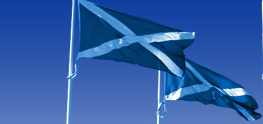UK Offshore Revenues Fall
Scotland’s illustrative share of UK North Sea revenue fell from £1.8bn ($2.37bn) in 2014-15 to just £60mn in 2015-16, reflecting a decline in total UK North Sea revenue, the new Government Expenditure and Revenue Scotland (GERS) statistics show.
The report considers two approaches to dividing up the revenue: on a percentage of the geographical production basis (which produced the £1.8bn and £60mn totals) and on a per-capita basis (for which the figures are £186mn and £6mn respectively).
North Sea revenue comes from four sources: petroleum revenue tax, corporation tax, licence fees, and the emissions trading scheme. UK North Sea revenue was £11.0bn in 2011-12, GERS said in its August 24 report, but has been declining since, owing to lower production, rising expenditure, and, since 2014-15, lower oil prices.

Scotland's national flag (Photo credit: Scottish government)
North Sea revenue is subject to annual fluctuations and is driven by a number of factors, including the oil price, the sterling dollar exchange rate, production, operating expenditure, capital investment, and the prevailing fiscal regime. Most of these factors have been acting to reduce revenue in recent years, with lower oil prices in particular having an impact over the past two years.
The average monthly Brent crude oil price fell by nearly 36% over 2015-16. UK crude oil and natural gas liquid production was 18% higher in 2015-16 compared with 2014-15, while gas production rose 9% over the same period. Operating expenditure fell by 15% in 2015, while investment fell by 22% over the same period.
The March 2016 Budget also saw the Supplementary Charge being halved to 10%, while Petroleum Revenue Tax (PRT) was reduced from 35% to 0%, having been reduced from 50% in the March 2015 Budget. PRT receipts are now negative, reflecting the fact that, although companies no longer pay PRT, they can still claim refunds on PRT paid in previous years against current trading losses and decommissioning spending. As a result PRT receipts will only be negative in the future under the current tax regime.
William Powell


